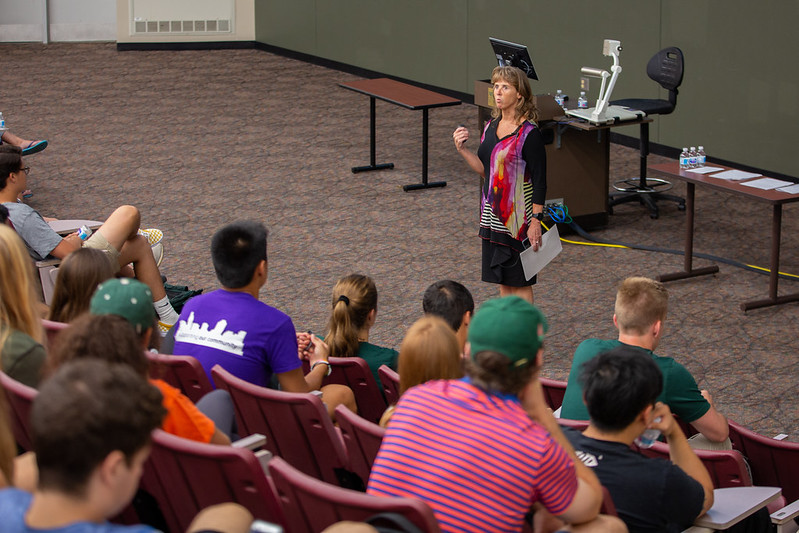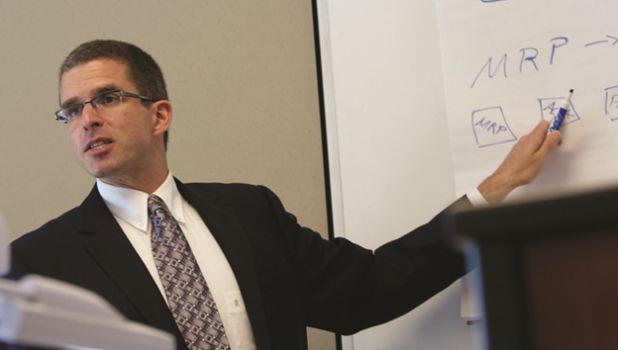Cheri Speier-Pero is the associate dean for undergraduate programs and the Ernst and Young Professor in Accounting and Information Systems in the Broad College of Business. Tobias Schoenherr is the Hoagland-Metzler Endowed Professor in Purchasing and Supply Management in the Broad College of Business.
Experiential learning has become a hallmark for many business schools, enabling best learning outcomes through the actual experience and application of course content. This is key for the Broad College’s mission, as we strive to create and disseminate knowledge through collaborative relationships.
Our Master of Science in Business Data Science and Analytics was designed to complement courses with a series of scaffolding analytics projects. Students work on company projects to practice and apply the skills learned in the courses from the very first semester — which is perhaps the most unique attribute of our program.
We recently highlighted MSBDSA successes in a research article, which showcases how an entire graduate degree program can be centered around experiential learning projects, affording deeper learning and internalization of course content. We also found industry-academic partnerships have the potential to advance academic research and the rigor of actual practice.
Designed for success
The first project experience begins with kickoff meetings — prior to students attending their first formal class — and each student is assigned to a small team, focusing on one firm. Participating companies include Fortune 500 and medium-sized businesses in the insurance, automotive, financial services, energy and manufacturing industries, as well as governmental entities.
The second project experience takes place after the first semester and takes one of two forms — a technically demanding project for a team of students or a paid internship experience where one student is embedded within an organization. Finally, a third project experience aligns to the final semester where greater analytics sophistication is required.
While many of the projects involve customer-facing applications creating predictive models regarding customer churn and customer lifetime value, there is increasing interest in financial, cost management, supply chain management and human resource management applications. The analytical tools applied have ranged from traditional statistics to sophisticated predictive modeling applications and programming in R to develop customized statistical and visual analyses.
These projects would not be possible without deep scholar-practitioner engagements, especially when focusing on developing student skills around analytics. Oftentimes, the depth and level of engagement between partners develops over time from transactional relationships (career fairs, job interviews) to collaborative relationships (capstone projects, company-led course sessions) to alliances (student mentorships by company employees, students embedded in companies for project-specific expertise). In the MSBDSA context, faculty mentors become the connective tissue between the students and the firm, ultimately becoming the link in the academic-industry partnership.
Creating value for all involved
There are three unique ways in which MSBDSA scholar-practitioner engagements have leveraged faculty expertise resulting in value for all parties.
- Consulting opportunities arise for faculty when firms want to perpetuate forward progress on the students’ work. While such extensions are by no means the norm, they result in significant value, offering faculty deep knowledge that may enhance their research and teaching in analytics.
- Faculty can also extend student projects with organizational partner support, leveraging the data for academic publications. For example, one faculty mentor is continuing a project with General Motors to help predict which customers will likely renew its OnStar product.
- To accelerate research to understand and predict social, economic, business, and government processes, the Center for Business and Social Analytics was created. The Center provides and coordinates resources to facilitate multi-college faculty collaboration resulting in the sharing of ideas and innovations. The primary impetus of the CBSA is on positioning groups of faculty to be successful in receiving external grant funding opportunities.
For students, this hands-on learning experience has been very positive. Student feedback on the value of the corporate projects experience in general and the fall capstone project experience in particular, average 6.5 and 6.4 respectively, on a 7-point scale. We also see the overall project-focused curriculum is one of the most-cited unique advantages of the program. To top it off, experiential projects create reverberations that affect students directly — with 50 percent of project partners hiring students as interns and full-time employees.
Our partner firms have been highly satisfied with their project experience. We have partnered with 25 companies supporting a total of 44 projects, and 75 percent of those that served initially as project partners seek out subsequent project opportunities. While not all these opportunities materialize into additional projects, about 50 percent of all firms end up offering multiple projects.
Our research highlights the project-based focus of an MSBDSA program as integral toward creating and nurturing academic-industry relationships leading to scholar-practitioner engagements and impactful student learning. These relationships can be sustainably leveraged not only for the improvement of practice and the enhancement of the student learning experience, but also for the enhancement of our discipline from a research perspective.

